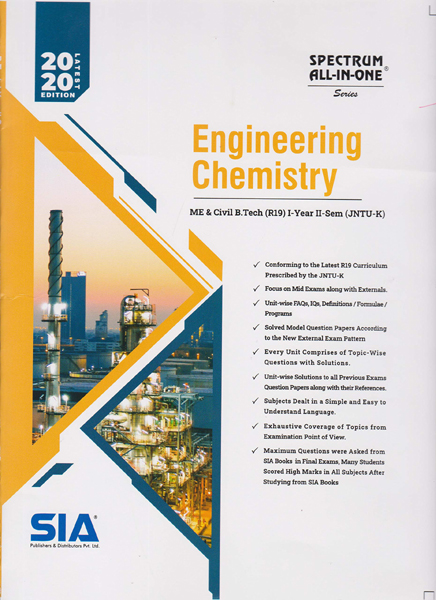

Note: Please check your Spam or Junk folder, in case you didn't receive the email with verification code.
SYLLABUS
Unit-1
Polymer Technology Polymerization: Introduction - Methods of Polymerization (Emulsion and Suspension) - Physical and Mechanical Properties. Plastics: Compounding - Fabrication (Compression, Injection, Blown Film, Extrustion) - Preparation, Properties and Applications of PVC, Polycarbonates and Bakelite - Mention Some Examples of Plastic Materials Used in Electronic Gadgets, Recycling of e-plastic Waste. Elastomers: Natural Rubber - Drawbacks - Vulcanization - Preparation, Properties and Applications of Synthetic Rubbers (Buna S, Thiokol and Polyurethanes). Composite Materials: Fiber Reinforced Plastics - Conducting Polymers - Biodegradable PolymersBiopolymers - Biomedical Polymers.
Unit-2
Electrochemical Cells and Corrosion Single Electrode Potential - Electrochemical Series and Uses of Series - Standard Hydrogen Electrode, Calomel Electrode - Concentration Cell - Construction of Glass Electrode - Batteries: Dry Cell, Ni-Cd Cells, Ni-Metal Hydride Cells, Li ion Battery, Zinc Air Cells-Fuel Cells: H2 -O2 , CH3 OH-O2 , Phosphoric Acid, Molten Carbonate. Corrosion: Definition - Theories of Corrosion (Chemical and Electrochemical) - Galvanic Corrosion, Differential Aeration Corrosion, Stress Corrosion, Waterline Corrosion - Passivity of Metals - Galvanic Series - Factors Influencing Rate of Corrosion-Corrosion Control (Proper Designing, Cathodic Protection) - Protective Coatings : Surface Preparation, Cathodic and Anodic Coatings, Electroplating, Electroless Plating (Nickel). Paints (Constituents, Functions, Special Paints).
Unit-3
Chemistry of Materials Nano Materials: Introduction - Sol-gel Method - Characterization by BET, SEM and TEM Methods - Applications of Graphene-Carbon Nanotubes and Fullerenes: Types, Preparation and Applications. Thermal Analysis Techniques: Instrumentation and Applications of Thermogravimetric Analysis (TGA) - Differential Thermal Analysis (DTA) - Differential Scanning Calorimetry (DSC). Refractories: Definition - Classification - Properties (Refractoriness, Refractoriness Under Load, Porosity and Thermal Spalling) - Failure of Refractories. Lubricants: Definition - Mechanism of Lubricants and Properties (definition and importance). Cement: Constituents - Manufacturing - Parameters to Characterize the Clinker Formation: Lime Saturation Factor (LSF) - Silica Ratio (SR) and Alumina Ratio (AR) - Chemistry of Setting and Hardening - Deterioration of Cement.
Unit-4
Fuels Introduction - Calorific value - HCV and LCV - Problems using Dulong’s Formula - Proximate and Ultimate Analysis of Coal Sample - Significance of These Analyses - Problems - Petroleum (Refining - Cracking) - Synthetic Petrol (Fischer Tropsch and Bergius) - Petrol Knocking - Diesel Knocking - Octane and Cetane Rating - Anti - Knock Agents - Introduction of Alternative Fuels (Bio - Diesel, Ethanol, Methanol, Natural Gas, LPG, CNG) - Flue Gas Analysis by Orsat Apparatus - Rocket Fuels.
Unit-5
Water Technology Hardness of Water - Determination of Hardness by Complexometric Method - Bioler Troubles (Priming and Foaming, Scale Formation, Boiler Corrosion, Caustic Embrittlement) - Internal Treatments - Softening of Hard Water (Zeolite Process and Related Sums - Ion Exchange Process) - Treatment of Industrial Waste Water Portable Water and its Specifications - Steps Involved in Purification of Water - Chlorination - Break Point Chlorination - Reverse Osmosis and Electro Dialysis.
 No Preview is available for this book
No Preview is available for this book

 Get 100 instant uPoints on the purchase of Rs.100 or above for each order.
Get 100 instant uPoints on the purchase of Rs.100 or above for each order.
CategoriesEngineering

Format EPUB

TypeeBook